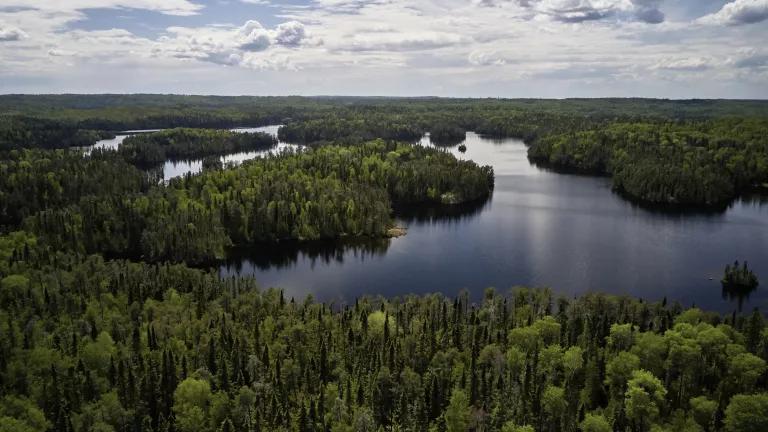Colorado Governor Ushers in a New Era of Boreal Protection
In a few sentences inked in an Earth Day announcement, Colorado has sent a strong signal to boreal countries that the world can no longer afford to ignore their industrial logging practices.

Canadian Boreal Forest
Over the past 30 years of global and domestic forest policy, threats to the boreal forest have been at best a footnote. Countries like Canada have hidden their industrial logging practices behind a façade, deflecting global attention to the tropics and obscuring their own erosion of climate-critical forests behind reassuring claims of “sustainable forest management.” Forest protection meant tropical forest protection, putting the onus on the Global South to address what the Global North was unwilling to confront in its own backyard. Now, with a new executive order from Governor Polis of Colorado, the erasure of the boreal forest is ending. In a few sentences inked in an Earth Day announcement, Colorado has sent a strong signal to boreal countries that the world can no longer afford to turn a blind eye to their industrial logging practices.
This Colorado executive order (EO), for the first time in a policy in the U.S., explicitly enshrines protection for the boreal forest and of the rights of the Indigenous Peoples who live there. The EO encourages state agencies and departments to give preference to vendors that avoid both tropical and boreal deforestation and intact forest degradation and guarantee Indigenous Peoples’ internationally recognized right to free, prior and informed consent (FPIC) for any industrial operations on their traditional territories. Through this provision that places the Earth’s northern lung alongside its southern, Colorado has recognized the need to tackle forest protection from a truly global perspective and hold countries in the Global North to the same standards as those in the Global South.
The longstanding absence of the boreal forest from international and domestic policy frameworks belies both its global importance and the profound threats it faces. The boreal, as the most carbon-rich terrestrial ecosystem in the world, is essential to meeting global climate targets. In Canada alone, the boreal stores twice as much carbon as the world’s oil reserves, and twice as much per acre as tropical forests. It is home to species found nowhere else on earth, including billions of migratory birds, and Indigenous communities from the First Nations of Canada to the Sami in Scandinavia. This miraculous forest has thrived since time immemorial in a vibrant tapestry of evergreen life near the top of the world.
Yet, over the past several decades, the boreal’s irreplaceable primary (never-before-logged) forests have faced a quiet extinction, driven in large part by unsustainable logging practices. While policymakers have focused on the tropics, the first- and third-highest intact forest loss in the world is happening in Russia and Canada, respectively, which are both predominantly boreal regions. In the last 60 years, Sweden has lost over 70% of its lichen-rich forests to the logging industry and ranks first globally in tree loss per capita, just ahead of Norway, Canada, and Russia.
Canada has been among the worst offenders of deflecting its role in driving the loss of climate-critical boreal forests. While Canada has carefully cultivated a green veneer around its forest policies, the reality of the Canadian logging industry’s impact on people, climate, and wildlife is globally devastating. Each year, the Canadian logging industry clearcuts over a million acres of forest, replacing areas of high-carbon primary forest with stumps, saplings, and the indelible footprint of logging roads. This logging has approximately the same greenhouse gas footprint as Canada’s tar sands operations, but the Canadian government has systematically pushed these emissions off the ledger books.
Rather than embracing solutions, Canada has stood in the way of global efforts to spur more sustainable supply chains. While the Colorado EO is the first boreal policy enshrined in law, it’s not the first one proposed.
Last year, Canada became the only country to oppose state procurement bills in California and New York that, similar to the EO, would have required state contractors to avoid tropical and boreal deforestation and intact forest degradation and ensure FPIC. The Government of Canada aligned itself with regressive logging industry actors and embarked on an aggressive and misleading campaign in both states’ legislatures to have the boreal removed from the bill. Unfortunately, in California, after the bill passed the Assembly, Canada succeeded in once again erasing boreal protection from public policy.
In New York, the boreal is still in the bill, and, three days after the EO announcement, the Canadian government relaunched its opposition efforts.
In opposing procurement efforts similar to the Colorado EO, Canada is fighting against a rising tide of scientists, marketplace leaders, and public officials calling for boreal forest protection. The EO came just weeks after the starkest warning yet from international scientists about the consequences of failing to reckon with the drivers of global climate change, including the loss of global primary forests, and in the wake of a letter to the Canadian Government from nearly 100 scientists that urged the protection of Canada’s primary forests as “a critical lifeline to a safe climate.” Investors are increasingly calling on companies like Procter & Gamble and Home Depot to address primary forest degradation in their wood sourcing commitments, while policymakers, including the Biden Administration, are also turning their attention to the loss of Northern primary forests.
Colorado’s Earth Day EO marked an unmistakable crack in the façade surrounding Northern forests and signaled a new era of policy leadership on boreal forest protection. Most importantly, this policy showed that, once the artifice surrounding the loss of boreal forests is dismantled, it lays bare that solutions are not just essential, but also in reach.



